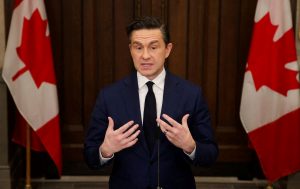SEOUL—South Korea’s president lifted his martial-law declaration after Parliament voted against the measure, rejecting his claim that political opponents had made the nation vulnerable to North Korean “communist forces.”
President Yoon Suk Yeol ’s address at around 4:30 a.m. local time on Wednesday ended what had been a tense night sparked by his earlier announcement. Lawmakers scaled fences and made their way past armed guards to enter the country’s National Assembly in downtown Seoul, voting 190-0 against the measure early Wednesday morning. Martial law had been declared more than two hours earlier, taking effect at 11 p.m. local time on Tuesday.
The stunning series of events came as Yoon’s approval ratings hit lows in the midst of a bitter budget showdown with the opposition and infighting over political scandals inside his own conservative People Power Party. On Tuesday, Yoon accused opposition parties of holding the South Korean parliamentary process hostage and posing a threat to the country’s constitutional order.
Yoon’s cabinet approved a motion to end martial law about six hours after the South Korean leader’s initial declaration. The country’s military said that troops who had been deployed to enforce martial law had returned to their bases.
South Korea’s conservatives have long accused the opposition of harboring sympathies for North Korea. But Yoon, a career prosecutor who took office in 2022 and became close to President Biden, had increasingly branded his political enemies as antistate groups. In a 2023 speech, he described the country’s polarization as a “confrontation between liberal democracy and communist totalitarianism.”
In his televised speech earlier on Tuesday announcing the move, Yoon, 63 years old, explained his rationale in an address that ran just over five minutes: “The martial law is aimed at eradicating pro-North Korean forces and to protect the constitutional order of freedom,” he said.
The U.S. hadn’t been notified in advance of the martial-rule decision, said a spokeswoman for the White House’s National Security Council. She added that Seoul and Washington had since been in touch. South Korea is home to the U.S.’s largest overseas military base and hosts roughly 28,500 American military personnel.
A spokesman for the State Department said the U.S.’s diplomatic posture toward South Korea hadn’t changed, although he called Yoon’s declaration of martial law a “serious and grave concern.”
Sharp criticism
Yoon’s move Tuesday was remarkable even by the standards of South Korean politics, which have been turbulent since the country’s transition to democracy in 1987 after decades of brutal military rule. Several former presidents have been sent to prison after leaving office. Park Geun-hye, the country’s first female leader and the daughter of one of South Korea’s former military dictators, was impeached, then ousted from office in 2017 over an influence-peddling scandal.
Despite the pugilistic politics, no South Korean leader had instituted martial law in more than four decades. Doing so, under the stipulations of martial law, puts local media under government control, halts all political activity, and orders all medical personnel to return to work within 48 hours, among other measures.
Both the opposition Democratic Party and Yoon’s ruling People Power Party slammed Yoon’s move as unconstitutional.
“President Yoon has made a big political mistake,” said Ramon Pacheco Pardo , the KF-VUB Korea chair at the Brussels School of Governance.
Yoon, whose approval ratings have dropped below 20% recently, will now face tough questions about his political future. Yoon is roughly at the midpoint of a five-year term that is to end in 2027. By law, he isn’t allowed to run for re-election.
One of South Korea’s largest newspapers, the center-right JoongAng Daily, said in an editorial that it would be doubtful that Yoon maintains his presidency after declaring martial law. “The discussion regarding the president’s impeachment has become inevitable,” the editorial read.
In frigid temperatures, hundreds of South Koreans gathered well past midnight in front of the National Assembly building, with helicopters flying above their heads and police standing watch. The protesters chanted: “Impeach Yoon Suk Yeol!”
Yoon was a prosecutor with no political experience before he narrowly won South Korea’s presidency in March 2022. The country remained divided after he took office. According to a 2022 survey by Pew Research Center, the only country with higher perceived levels of partisan conflict than the U.S. was South Korea.
This year, South Korea remained on an even more dramatic political edge. In January, Lee Jae-myung, head of the left-leaning Democratic Party, was stabbed in the neck and required emergency surgery. The alleged assailant said he wanted to prevent Lee from winning the presidency in 2027 and more immediately block the Democratic Party from racking up a victory in the next legislative election. Weeks later, a conservative lawmaker was attacked .
A blowout loss
In April, Yoon’s ruling party suffered a blowout loss in the legislative elections . That meant Yoon would struggle to pass any legislation for his domestic agenda, making him a de facto lame duck. About two-thirds of South Koreans hold negative perceptions of Yoon’s ability to run the country, recent polling shows.
Han Dong-hoon, the head of Yoon’s People Power Party, called Yoon’s move to declare martial law an illegal, unconstitutional move. “South Korea is a democratic country. We will protect democracy alongside our citizens,” said Han, a former justice minister in Yoon’s cabinet.
After the vote to nullify martial law, Lee, the opposition leader, vowed to turn the political crisis into an opportunity to return South Korea to normalcy. “Even though our nation continues to retreat, the situation will not become worse due to this illegal, unconstitutional declaration of martial law,” he said.
The political instability led to declines in the U.S. shares of several South Korean companies. The e-commerce giant Coupang dropped 3.7%. The iShares MSCI South Korea ETF fell 1.6% after declining as much as 7% earlier.
Meanwhile, the value of the South Korean won fell against the U.S. dollar in global currency markets. In early Wednesday trading, South Korea’s benchmark Kospi index was down around 1%. Officials vowed to inject more than $35 billion in emergency funds into the country’s stock and bond markets in the face of major selloffs.
It will be important for Yoon to quickly give a more detailed explanation for his actions, said Troy Stangarone , a Korea expert at the Wilson Center, a nonpartisan think tank in Washington, D.C. “Without a deeper explanation, this could be perceived as settling domestic political disputes through martial law rather than the domestic process,” he said.
Write to Dasl Yoon at dasl.yoon@wsj.com , Jiyoung Sohn at jiyoung.sohn@wsj.com and Timothy W. Martin at Timothy.Martin@wsj.com


